By George Beccaloni
Free-standing monuments
-
Monument on Wallace's grave. CLICK HERE for information.
-
Llanbadoc monument. CLICK HERE for information.
Plaques and other fixed monuments dedicated to Wallace
-
Plaque on Wallace's house, The Dell, Grays, Essex. CLICK HERE for information.
-
Plaque on "Treeps"; the house in Hurstpierpoint, Sussex, where Wallace wrote The Malay Archipelago. CLICK HERE for information.
-
Small stainless steel plaque on a metal bench on the bank opposite the cottage where Wallace was born near Usk, Wales. It reads "Erected by the Llanbadoc Community Council August 1988 to commemorate Alfred Russel Wallace OM. FRS 1823 - 1913 Self-taught scientist. World traveller. Social reformer and originator of the theory of evolution independantly [sic] of Darwin in 1858. Born in Kensington Cottage (opposite) and lived there until 1828."
-
Plaque outside the Usk Rural Life Museum (in the Malt Barn, New Market Street, Usk, Wales).
-
Plaque on the house (now a doctors' surgery) at 11 St. Andrew's Street in Hertford were Wallace may have lived for a time when he was a child. This has been named "Wallace House" and there is a circular concrete plaque over its door which reads: "In this house lived Alfred Russel Wallace OM. LLD. DCL. FRS. FLS. Born 1823 - Died 1913. Naturalist, Author, Scientist. Educated at Hertford Grammar School."
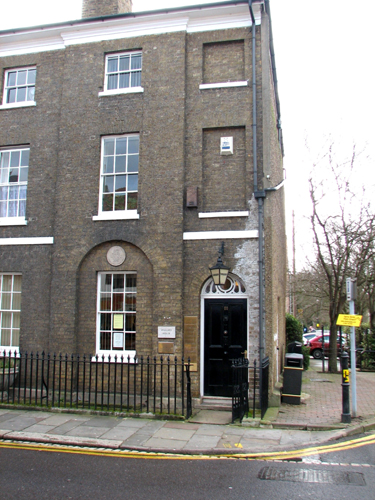
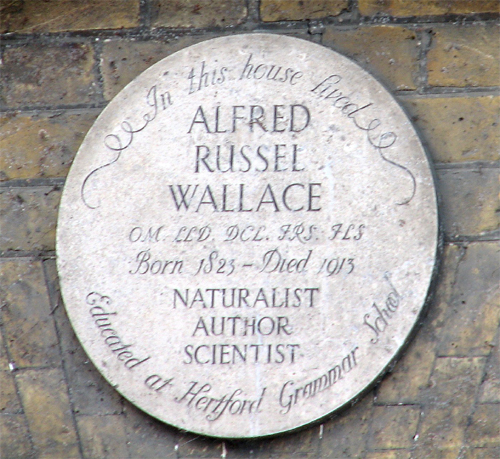
11 St. Andrew's Street, Hertford. Copyright Tom Gladwin
Plaque on wall of 11 St. Andrew's Street, Hertford. Copyright Tom Gladwin
-
Stone plaque on the wall of the "Mechanics' Institute" which Wallace and his brother John designed in 1846, in Church Place, Neath, Wales. The building is now used as offices by the Neath Museum. The plaque reads "Neath Borough Council Alfred Russell [sic] Wallace 1823 - 1913 Designed this building. He lived in Neath from 1841 to 1848 during which period he worked as a surveyor and studied natural history. In his lifetime he collaborated [sic] with Charles Darwin in the study of the laws of natural selection. And with him presented the first paper on the subject in 1858."
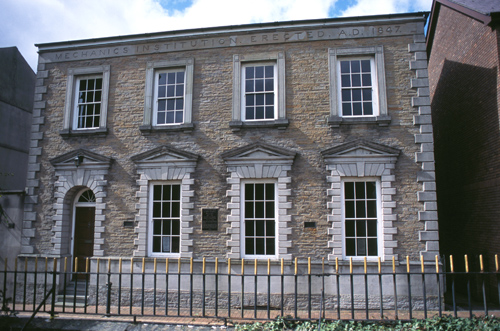
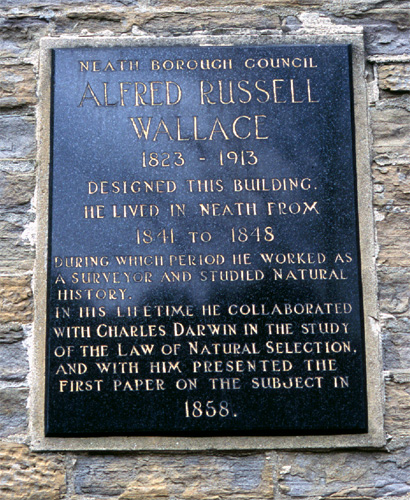
Neath 'Mechanics' Institute'. Copyright G. W. Beccaloni
Plaque on wall of Neath 'Mechanics' Institute'. Copyright G. W. Beccaloni
-
English Heritage "Blue Plaque" on a house which Wallace called "Pen-y-Bryn" (subsequently numbered 44) in St Peter's Road, Croydon, London where he lived sometime between 9 January and 11 October 1880, and May 1881. The plaque was put on the house in 1979 and reads "Alfred Russel Wallace, 1823-1913, Naturalist, lived here".
-
There used to be a rectangular commemorative plaque on the wall of Wallace's house "Old Orchard" in Broadstone, Dorset, which read "Alfred Russel Wallace O.M. F.R.S., Naturalist and Explorer, lived here 1902 - 1913". The plaque was made by Poole Pottery, and when the house was demolished in 1964 it was apparently given by the Linnean Society to the Bournemouth Natural Science Society, who may still have it (the late Barbara Waterman, pers. comm., 1999).
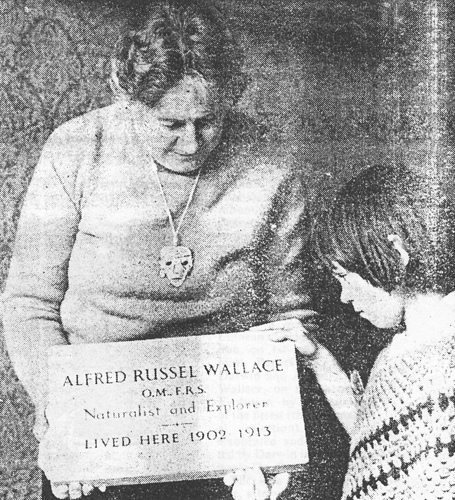
Photo of plaque from Old Orchard in an undated article from The Bournemouth Evening Echo.
- Circular white marble medallion of Wallace featuring a side profile of his head, facing left, in Westminster Abbey in the North Aisle of the Choir, between those of Charles Darwin and Joseph Lister. This was commissioned by the Wallace Memorial Committee and carved by Albert Bruce-Joy, who based it on a medallion he had previously made of Wallace from photographs and in life. It was unveiled on 1st November 1915.
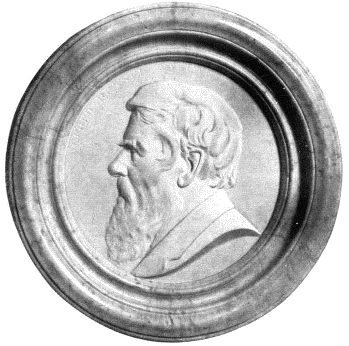
The medallion in Westminster Abbey
-
Roundel in the pavement at Bircherley Green Shopping Centre in Hertford (near Waitrose supermarket) which features eight species of animals discovered by Wallace. The roundel was designed by Zulver & Co., London in consultation with George Beccaloni, who selected the animals for illustration and wrote the inscription. It was installed in 2007. The inscription reads "Alfred Russel Wallace (1823 - 1913). Naturalist, scientist, explorer, writer, social campaigner, humanitarian. Wallace was born in Usk, Wales. He moved to Hertford at the age of five, living here for nine years where he studied at Hertford Grammar School. During 1858 Wallace made his most important contribution to science, his co-discovery with Charles Darwin of the process of evolution by natural selection." Animals illustrated are: Wallace's Cyriopalus Beetle - (Cyriopalus wallacei); Wallace's Flying Frog - (Rhacophorus nigropalmatus); Resplendent Jewel Beetle - (Chrysochroa wallacei); Striped Possum (Dactylopsila trivirgata); Wallace's Giant Bee - (Megachile pluto); Altum Angelfish - (Pterophyllum altum); Wallace's Golden Birdwing Butterfly - (Ornithoptera croesus); and Wallace's Standard-Wing - (Semioptera wallacei).
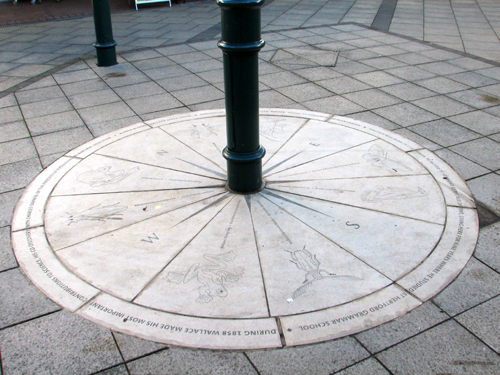
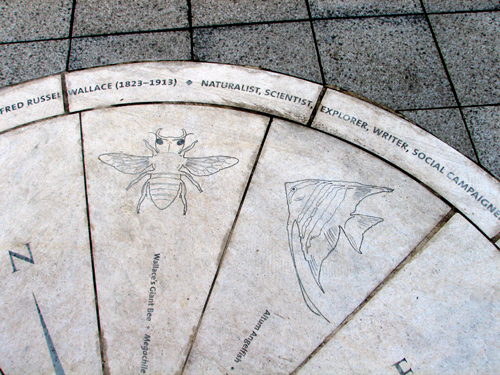


Views of roundel at Bircherley Green Shopping Centre, Hertford. Copyright Tom Gladwin - Pottery plaque of a young Wallace at the University of San Francisco in Quito, Ecuador. (Photo copyright Piers Hale)

Plaques and other fixed monuments dedicated to Wallace plus someone else
- Plaque commemorating Wallace and Henry Walter Bates on the right hand side of the main entrance to the Leicestershire Museum & Art Gallery in New Walk, Leicester.
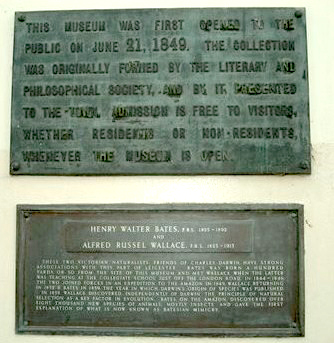
Plaques on Leicestershire Museum, Leicester. Copyright Tom Gladwin
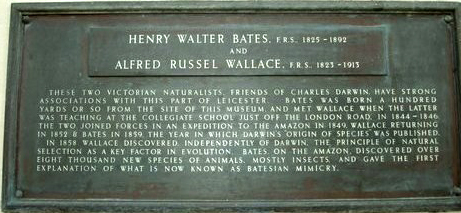
Closeup of lower plaque. Copyright Tom Gladwin
-
Plaque in Manaus, Brazil commemorating Wallace and Henry Walter Bates, which was unveiled on the 27th September 2004 during the Third International Colloquium on the History of Darwinism in Europe and the Americas, which was held in that city.

The Manaus plaque. Copyright Roberta Kacowicz
- Brass plaque in Meetings Room of the Linnean Society which commemorates the 100th anniversary of the reading of Darwin and Wallace's papers at the Linnean Society. The inscription reads "Charles Darwin and Alfred Russel Wallace made the first communication of their views on the origin of species by natural selection at a meeting of the Linnean Society on 1st July 1858. 1st July 1958."
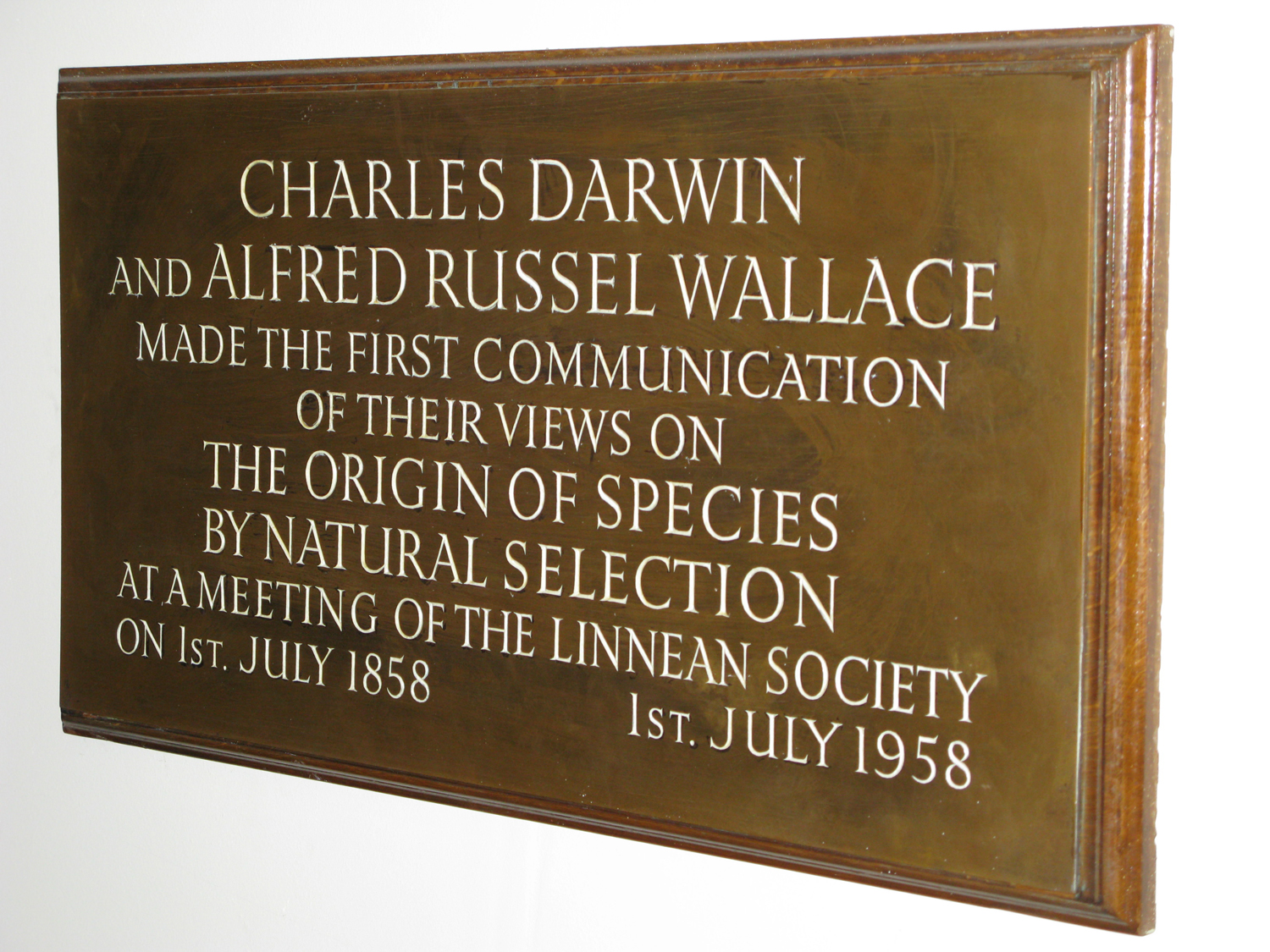
Linnean Society plaque commemorating the 1858 July 1st anniversary
Details about the installation of the plaque.
- Panel in the Reynolds Room of the Royal Academy of Arts, Burlington House, Piccadilly, London, commemorating the reading of the Darwin-Wallace papers on natural selection in that room in 1858 when the Linnean Society was based there. It reads "Charles Darwin and Alfred Russel Wallace gave a paper on the origin of species by natural selection at a meeting of the Linnean Society in the Reynolds Room on 1st July 1858. This panel was unveiled on 26th November 2001".
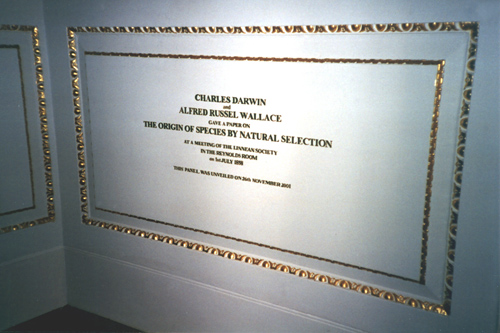
Panel in Reynolds Room of Royal Academy of Arts. Copyright Janet Beccaloni
